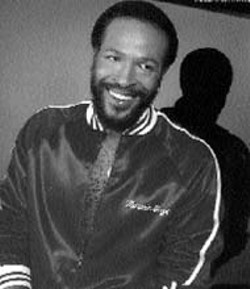Not bad for a singer who's been dead 18 years.
I'm grateful that Marvin Gaye is with us again, but for me, as for millions of people who still buy his records, he never really went away. Even today, listening to certain Marvin Gaye songs, I feel a weight in my chest, as if gravity has suddenly increased its pull in the region of my heart. Perhaps that's heartache, or the memory of its physical shape. It's always bittersweet; Marvin can do that to you.
Author Steve Erickson once wrote that the great American novels of the 20th century could be found in the music of artists like Springsteen, Dylan, Chuck Berry and Marvin Gaye. And Gaye, who was murdered on April 1, 1984, the day before his 45th birthday, was a brilliant storyteller. He had a genius for using his voice to explore and telegraph infectious grooves, smoky sensuality or, in the case of his 1971 self-produced masterpiece, What's Going On, compassion and concern.
Musically elegant and politically radical, What's Going On was entirely unlike the bright, buoyant music coming off the Motown assembly line. It was the first album created by a black artist that addressed the social upheaval of America at the end of the 1960s: the Vietnam War, race riots, unemployment and poverty in the inner city, pollution, the assassinations of beloved leaders. The songs take the point of view of a Vietnam vet -- specifically, Marvin's brother Frankie, who returned from the war with stories that horrified Marvin and kindled his social conscience. Frankie, in a sense, is the album's narrator, but it is a spiritual self-portrait of Marvin Gaye.
For me, What's Going On conjures up a newsreel of my childhood, the events of a decade oddly compressed.
My best friend's brother, Bobby J, had just come back from Vietnam. Many others in our predominantly Latino neighborhood had not. The war flickered across our television screen nightly and Walter Cronkite grew old before our eyes, reciting the body count. My father watched with tears rolling down his cheeks and he cursed Lyndon Johnson. "Hey Hey LBJ, how many kids did you kill today?" we chanted at peace marches.
The images remain indistinct to me, just vague outlines. The music fills in the color, adds emotional truth. In a seamless, 35-minute-long song cycle, Marvin Gaye articulated the country's shock and disbelief, asked the question everyone was asking. He depicted the crises of the day vividly, but without hostility or rancor. As Gaye chronicler Ben Edmonds observed, "The lyric expresses extreme hurt and anger, yet the song never gives in to either."
War and Peace
It's a quirk of fate that art born of rage and hatred rarely stand the test of time. The human soul seeks reconciliation; thus, more than 30 years after its release, record stores still have trouble keeping What's Going On in stock. The title song is one of our culture's most indelible anti-war anthems. The other, of course, is John Lennon's great "Imagine," which was also released in 1971. Lennon envisioned the possibilities of a world at peace; Gaye looked unflinchingly at the ugliest realities of society and asked how things got so bad. Neither song ever seems to get dated (war, after all, hasn't gone out of style).
"He's our John Lennon," Janet Jackson once said of Marvin Gaye. Yet remembering Gaye is not like remembering Lennon. At the time of his death, Lennon had made peace with his private demons and with the fanatical spiral of his celebrity. He had matured as an artist and as a man. The week Lennon was killed, a grieving Michael Ventura wrote in the L.A. Weekly of the irony that John Lennon, like Malcolm X, "was only shot after he had conquered the violence in himself."
Unlike the former Beatle, Marvin Gaye was a tremendously conflicted performer who died before he had a chance to quiet the commotion in his life and the violence in himself. He had an increasingly out-of-control cocaine addiction. Both his marriages had unraveled. He was a superstar frightened of fame; a hitmaker who longed to be considered an artist. Deeply religious, he was ambivalent about his status as a sex symbol and even talked of becoming a monk, yet he created some of the loveliest and most erotic songs in pop music. Most painful of all was his unresolved conflict with his father, a retired Pentecostal minister. It wasn't for nothing that David Ritz titled his biography of Gaye Divided Soul.
Perhaps his troubled character is one reason why What's Going On echoes with such pathos. We miss John Lennon; we mourn Marvin Gaye. It's not only that the conversation is left unfinished -- that's the case with every death -- it's that the man himself was left unfinished, incomplete. We never got to see if he could embody the integrity of What's Going On -- to see if the minister's son could practice what he preached.
After The Dancing
It's 1978 and "Let's Get It On" is still on the radio and our lips. Things have changed -- the groove is sensual, the boundaries exploded open. For some of us who grew up in the shadow of the Vietnam War, love and sex will always be inextricably linked with death. "You live as if there's no tomorrow," complain the adults, although they should know better, having been there too. Marvin's voice conveys such passionate yearning, it makes our skin hunger after contact. We're all sensitive people with so much to give.
But it wasn't just sex he was singing about, it was human sympathy, it was the sweet shelter of physical tenderness. In 1971, he told us love could repair the world; now he promised that love could repair our souls. We just needed to get on with it and get it on. Seduced and seductive, we dance and shimmy. Is it even possible to feel sexy without Marvin singing in the background?
Then comes 1984 and it ends with a gunshot. It's always a gunshot. It's barely spring and still cold. I'm barefoot in the kitchen making tea and my face is wet with tears because my housemate has stacked all our Marvin Gaye albums on the record player and one by one they drop onto the turntable and the drafty old house fills with his silky voice. Talk to me, I'll talk to you.
A bitter argument fueled by paranoia and aggression, ending with two rounds fired from a .38 caliber handgun. Murdered by his father! we repeat in shock. A sordid way to die. Yet, deep down, didn't we always suspect that our own families could kill us?
I think that was when the emotional color began to drain out of American life; when people started to regard the ideals and the struggles of the 60s with scorn. Maybe it started with Reagan's election in 1980 and John Lennon's murder the same year. Either way, the vibe turned cynical. We pontificate and analyze and criticize, and every day the world ends a little more.
Nuthin' Neo About It
Still, soul is back, and Marvin Gaye is largely responsible for its resurgence. What's Going On has inspired scores of artists, from Stevie Wonder and Quincy Jones to Sade, Michael Franti and Ryan Toby, lead singer of the trio City High. Traces of the album can be heard in the music of Steely Dan, Prince and dozens of others.
And soul music seems to be recovering some of its conscience, rejecting gangsta poses in favor of positivity and social commentary. I can't help but give Marvin some of the credit for that. People who weren't even born when the record came out are listening to it and absorbing its collective memories.
Jon Pareles wrote in the New York Times that Alicia Keys was electrified when she heard What's Going On for the first time. "It just hit me like a rock over the head," she said. "I had never heard a body of music like that, so in tune with people and reality and consciousness, socially and politically and in love with stillness and then turmoil. It was like everything that you ever have felt at one point or another all in one, bam!"
Keys and her contemporaries, Macy Gray, Jill Scott, Angie Stone and Erykah Badu, are well aware of their musical debt to Gaye. In an Entertainment Weekly interview, Keys and India.Arie were asked what they thought of the term "neo-soul" being used to market their music. They roundly dissed it.
"It makes it sound like we are a new version of something old," said India.Arie. "We're just a continuation of a legacy, not a copy or a throwback." Arie pays loving homage to her roots on her album, Acoustic Soul: "This is in remembrance of our ancestors / Sam Cooke and Marvin Gaye, Donny Hathaway / and all that came before / you opened up a door / 'cause of you, change gonna come."
Tributes And Tribulations
The latest Marvin Gaye tribute, also titled What's Going On, is a benefit for the Global AIDS Alliance and the September 11 Fund. It was recorded in New York by an all-star cast a week before the World Trade Center attacks. Like the album that inspired it, the 2001 What's Going On has nine tracks, but they're nine different remixes of the same song. It's an interesting concept that gets a little tired after a couple of listens. And some of the versions have a combative, in-your-face quality that Gaye instinctively steered clear of, believing that the artistry would inspire the activism.
I admit, I found it unsettling to hear former Mouseketeer Britney Spears crooning "Barricades can't block our way," and the Backstreet Boys' sugary rendition of "You see war is not the answer" was just as jarring. Truly, things ain't what they used to be. But activist Leigh Blake, who initiated the project, said that all the artists involved, no matter what their backgrounds, understood the significance of the lyrics.
"'N Sync -- who thought they'd know anything?" she told Jesse Kornbluth, who covered the recording session for Salon.com. "But Justin really got it. So did Britney, so did Alicia Keys. People did their parts and cried."
The ability to move people on a deep emotional level was Gaye's gift. Happily, he passed it on to his daughter Nona Gaye, whose achingly familiar voice can also be heard on the CD: Oh my father, father, we don't need to escalate.
We can memorialize the day of Gaye's death on April 1, or we can celebrate the day of his birth on April 2. His duality continues to unfold and his hopeful manifesto continues to communicate to new generations. What's Going On was the first album out of Motown to include the printed lyrics of the songs in the album liner. Marvin Gaye had something to say and he wanted to make sure people got the message. Thirty-one years later, we're still getting it. *
Latest in Vibes
-
Good Eats
Our critics' guide to recommended restaurants in Charlotte
-
ART: Contemporary Mosaic Art exhibit at Ciel Gallery
Friday, Sept. 3









